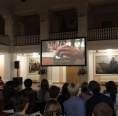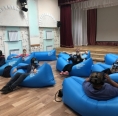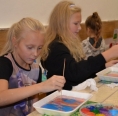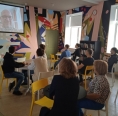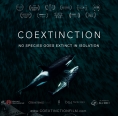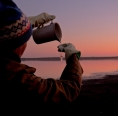-
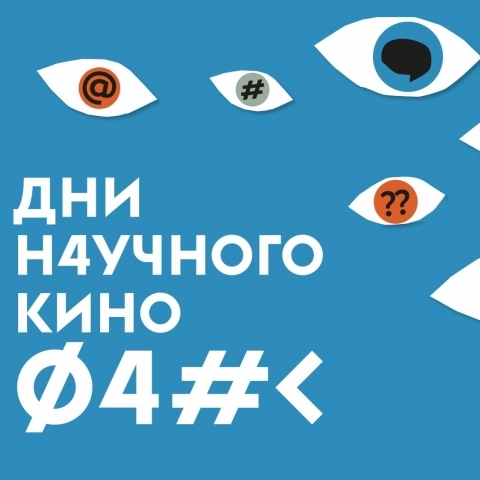
FASC
The Festival of Actual Scientific Cinema
-
Address:
Satka
-
Partners:
The Festival of Actual Scientific Cinema is a festival of a new format held annually in Satka. The festival is a mix of original documentaries on science and technology, scientific stand-ups, lectures and discussions. Its events do not follow the traditional festival format and are not tied to a specific time or place – they run in different cities throughout the year.
In 2014, the Magnezit Group became a partner of the International Contemporary Science Film Festival 360° for the first time.
In 2018 and 2019, the festival was held in Satka within the framework of the Interregional Festival of Education and Science. VR cinema, kinetic sand and Ebru painting areas were available to the residents and guests of the Satka District in addition to film screenings.
Since 2021, The Festival of Actual Scientific Cinema has been annually held in the Art-Satka creative public space.
2014
IV International Festival of Contemporary Science Films 360° arranged by the Polytechnic Museum finished in Moscow.
Tim’s Vermeer film of American director Raymond Joseph Teller won the grand prize of the Festival. The film tells about Tim Jenison, an inventor from Taxes, who is trying to find the answer to one of the main questions in the history of painting: how painter Jan Vermeer created such realistic works. In the search for the answer Tim goes to Holland, where Vermeer worked on his masterpieces, travels across the North coast of Yorkshire, meets with painter David Hockney and even visits the Buckingham Palace where the works of the master are stored. The research of Tim and his discoveries seem fantastic. And still they are proved by scientific facts.
The audience award was given to the film of South Korean director Kim Hyoungju The Basement Satellite which tells about an artist who has decided to make and launch a satellite on his own.
The special prize of 360° festival was given to The Pirate Bay: We’ll be back in a Minute film which tells about the creators of the largest torrent, The Pirate Bay. The authors of the film devoted their victory to all people fighting for the freedom of speech and in particular to the Russian journalist and human rights activist Anna Politkovskaya.
Sleepless in New York film gained the ‘honourable mention’. It tells the story of some people who have experienced parting with those they love and considers the parting in terms of cerebral physiology.
The Prize of the Student Jury was given to director of Alive Inside Michael Rossato-Bennet. Kapitsa Prize was given to Russian film The People of Putorano Plateau, a visually gorgeous documentary story about the untouched volcanic plateau in the polar region near Norilsk. The Prize of Brainstorm was given to Rules of Life of a Hundred Year Old Man, another Russian film telling about long-livers and the practices to extend the life.
Magnezit Group was one of the partners of the Festival.
The winners of IV International Festival of Contemporary Science Films 360°
2018
October 5 and 6, Satka will house the Festival of Education and Science. The Festival was organized by the Russian Academy of Education and the Government of the Chelyabinsk Region. October 5, Boris Dubrovsky, the Governor of the Chelyabinsk Region, will grant the prizes to award winners of the First Russian Competition of School Students’ Research Papers "The History of Home Area is the History of Motherland".
Education Issues
The first day of the Festival, October 5, is devoted to discussing burning issues of education that will be held in the halls of Magnezit Cultural Center.
The round table of the Russian Academy of Education will start the Festival with discussing today’s issues of education and upbringing. The topic of the round table is Upbringing Issues: the Role of Family and School.
“The issues of upbringing in school and family are particularly important. Of course, the family retains the priority in what refers to upbringing. But the school has huge potential to build genuine trustful relations with a child. And the innovative educational best practice of building such relations has been already developed. It is necessary to share and implement this knowledge”, – tells Artur Rean, Academician of the Russian Academy of Education, Chairman of the Russian Academy of Education Research Council for Family and Childhood.
Discussions about upbringing and learning children will be continued October 6, during the discussion meeting of the Russian Academy of Education Research Council for Family and Childhood. The meeting is to begin 11:00 a.m. in the events hall of Stroitel Cultural Center.
About the Home Area
4:00 p.m., Stroganov Readings will start. This is an applied science conference devoted to the role of the Stroganovs in History of Russian Education and Science featuring Stroganov Moscow State University of Industrial and Applied Arts and the Russian History Society.
The highlight of the Festival is the prize award ceremony for winners of the First Russian Competition of School Students’ Research Papers, The History of Home Area is the History of Motherland. The competition began January 20, 2018. All in all, over 300 student papers from 48 regions of our country were submitted to the competition. Leningrad Region, Moscow Region, Chelyabinsk Region, Samara Region and Republic of Dagestan are leaders in number of submissions. The award ceremony will take place in the lounge of Magnezit Cultural Center at 6.00 p.m.
Simple about Complicated
Science is extremely multi-faceted. Our life is governed by the laws and phenomena the scientists have been researching for years. Modern science has reached the highest level in digital technologies, medicine, astrophysics, neurophysiology, genetics and many other fields.
The purpose of the second day of the festival is to tell everybody, in the clear and accessible language, and to show what scientists and representatives of other professions do, how research improves quality of life, what perspectives it opens to contemporary people.
That is why, October 6, Stroitel Cultural Center invites all Satka children to visit the interactive scientific site, where everyone will be able to see and touch physical processes, create a robot or launch a chemical reaction. The event organizers believe that science can also inspire the choice of future career and professional goal. That is why the site also offers Orientir vocational guidance testing.
Will a computer be able to think like a person? This is the crucial question for thousands of IT researchers, or to be more exact, for those involved in creating artificial intelligence. Today, many technologies we have already got used to are already based on the algorithms of the so-called machine learning. Alphago film will tell about preparation to and fight between a person and a computer in the most humane game – go. The film show will start 7.00 p.m. (October 5) in the lounge of Magnezit Cultural Center.
“One day. One planet. Unbelievable miracles” is the guiding idea of the documentary called “The Earth: One Astonishing Day”. Life in the African savanna, on the uninhabited islands in the Pacific Ocean, in forests of Asia and in the sea bottom unfolds following the laws of an edge-of-your-seat action, a sentimental melodrama or a breathtaking thriller. The miracles have never been closer. You can see the film in Stroitel Cultural Center October 6, 4.00 p.m.
2019
In late October, Satka became the venue for The Second Interregional Education and Science Festival. The busy agenda of the Forum touched upon many pressing issues, including the responsible parenthood, mothers and fathers competencies development, and the healthy family relations formation.
The impressive composition of the festival itself testified that there would be a lot of relevant and useful information. Experts represented The Russian Academy of Education (RAE), Institute for Strategy of Education Development of The Russian Academy of Education, The Herzen State Pedagogical University of Russia, Nosov Magnitogorsk State Technical University and Russian Historical Society.
The grand opening of the festival took place at Magnezit Cultural Centre on October 22. The First Deputy Governor of Chelyabinsk Region Irina Gekht addressed the audience with a welcoming speech, then the organizers and participants of the event were greeted by the Head of Satka municipal district Alexander Glazkov; Chairman of the Social Policy Committee of the Legislative Assembly of Chelyabinsk Region Alexander Zhuravlyov; Member of RAE, Head of the Section of the Russian Psychological Society “Psychology of Family and Childhood”, Doctor of Psychology, Honoured Scientist of the Russian Federation Arthur Rean; Executive Director of the History of the Fatherland Foundation, member of the Presidium of the Russian Historical Society, Candidate of Historical Sciences Konstantin Mogilevskiy. In addition, A. A. Rean greeted everyone on behalf of the Deputy Minister of Education of the Russian Federation, Viktor Basyuk.
Everything starts with a Family
On October 22, the first day of the Forum, special attention was paid to the winners of the II All-Russia Competition of School Students Research Papers "The History of Family – The History of Fatherland". This year, more than 100 students of the 9-11th grade from 49 subjects of the Russian Federation took part in this completion. Two of three winners of the competition came to Satka with their teachers. A future military and a student of the 11th grade of Margelov Nizhny Novgorod Cadet School of the Volga Federal District Aleksey Slepanov topped the list of the winners with the Report on his great-grandfather The Komsomol Member – Volunteer and the Hero of the Soviet Union Aleksey Slepanov. A tenth-grader from Astrakhan Region, Samira Madenova (Guzhvin Lyceum No. 1, Kamyzyak) explored the great deed of her grandfather. The result of her patient work was the Paper on The Victory Banner over the Berlin City Hall planted by Kenzhebai Madenov. For her research, the Hero’s granddaughter was awarded the 3rd place.
The 2nd place in the II All-Russia Competition of Research Papers of Students The History of Family – The History of Fatherland was given to Polina Fedotova, a student of the 11th form from the city of Kingisepp of Leningrad Region, for her Project on Preserving historical memory: The Story of My Family.
The following took part in the Awarding ceremony: Chairman of the Supervisory Board of Sobranie Cultural Initiative Supporting & Preservation Fund, Member of the Committee of the Federal Project “Strong Family”, Russian National Political Party “United Russia” Sergey Korostelev; Executive Director of The History of Fatherland Foundation, Member of the Presidium of the Russian Historical Society, Candidate of Historical Sciences Konstantin Mogilevskiy; Member of RAE, Head of the Section of the Russian Psychological Society “Psychology of Family and Childhood”, Doctor of Psychology, Honoured Scientist of the Russian Federation Artur Rean.
The theme of family was continued by the meeting of the Council of the Russian Academy of Education for Family and Childhood "Family and School as The Resources for Success", chaired by Artur Rean, Member of RAE, Head of the Section of the Russian Psychological Society “Psychology of Family and Childhood”. The following people spoke at the meeting: Professor of Herzen State Pedagogical University of Russia, Director of Resource Centre “Childhood Free From Abuse and Cruelty”, Doctor of Psychology Elena Volkova; Associate Member of RAE, Chief Non-staff Educational Psychologist of Ural Federal District Olga Zotova; Advisor to Director for Training of Academic Personnel of the Institute for Strategy of Education Development of RAE, Associate Member of RAE, Professor, Doctor of Education, Honoured Scientist of the Russian Federation Vladislav Serikov; Chairman of the Social Policy Committee of the Legislative Assembly of Chelyabinsk Region Alexander Zhuravlyov; Member of Legislative Assembly of Chelyabinsk Region, President of Nosov Magnitogorsk State Technical University, Doctor of Engineering, Valeriy Kolokoltsev. During reporting and discussions the following subjects were touched upon: the influence of schools and families on personality formation of children and adolescents; prevention of antisocial behaviour among children and adolescents; the problem of bullying at schools; the need to draw educational programs at schools aimed at informing and preparing high school students for such an aspect of “adult” life as the creation of a family.
Explore your Region – Explore Yourself
One more subject of the first day of educational workshops was a round table called “Historical Tourism in the Territory of Ural Federal District”. The Chairman of the round table was the Executive Director of The History of Fatherland Foundation, Member of the Presidium of the Russian Historical Society, Candidate of Historical Sciences Konstantin Mogilevskiy. Special mention among the participants should go to the Chairman of the Board of the Department of the Russian Historical Society in Chelyabinsk Region, Professor of South Ural State University, Doctor of Arts, Honoured Artist of the Russian Federation Natalya Parfentieva, as well as to the Member of the Creative Union of Artists of Russia, Rector’s Advisor, Head of the Department of History of Arts and Humanities of Moscow State Stroganov Academy of Design and Applied Arts, Candidate of Art History Kirill Gavrilin. There were many people, who wanted to attend the meeting. The fireplace hall of the palace hardly had any place to accommodate all the visitors. Some of us know that there are many points on the Urals map that deserve the attention of researchers. However, a huge number of places still have not gained much popularity, although they can surprise even the most experienced local historians and travellers.
Each of the speakers also expressed the opinion on what can contribute to the development of domestic historical tourism: interactive programs, educational quests, reconstructions, and festivals. One of the most striking examples is Satka, where many industrial sites have already become art objects with Magnezit Group support.
- The activities related to the development of urban environment design and contemporary art are also important for tourism, - said the Rector’s Advisor, Head of the Department of History of Arts and Humanities of Moscow State Stroganov Academy of Design and Applied Arts, Candidate of Art History Kirill Gavrilin. - Actually, we are talking about the event tourism, which attracts youth and lovers of a new culture to a city. It is also important that the young generation is being formed in a completely different environment. On the other hand, here you can demonstrate the technology of combining patriotic education, popularization of historical monuments and a new culture. We can also draw a lot of good from international experience.
Pedagogical intricacies
On October 23, a discussion platform “Education of the 21st Century - Challenges and Opportunities” took place at Stroitel Cultural Centre. Representatives of the Russian Academy of Education, the Ministry of Education of the Russian Federation, and Herzen Russian State Pedagogical University, school teachers and psychologists gathered there to discuss the current issues of family and school interaction.
One more discussion platform was hosted by Satka Municipal Budgetary Educational Institution Secondary school No. 40. The moderators were as follows: Member of RAE, Chairman of the RAE Scientific Council on Family and Childhood, Head of the Section of the Russian Psychological Society “Psychology of Family and Childhood”, Doctor of Psychology, Professor Artur Rean; Professor of Herzen State Pedagogical University of Russia, Director of Resource Centre “Childhood Free From Abuse and Cruelty”, Member of the Presidium of the Federation of Educational Psychologists of Russia, Doctor of Psychology Elena Volkova; Associate Member of RAE, Chief Non-staff Educational Psychologist of Ural Federal District, Doctor of Psychology Olga Zotova; Advisor to Director for Training of Academic Personnel of the Institute for Strategy of Education Development of RAE, Associate Member of RAE, Doctor of Education, Honoured Scientist of the Russian Federation Vladislav Serikov. At the event, such issues as interaction between a family and a school were at the table. The need to increase parental literacy and to introduce measures to prevent teenage deviant behaviour was discussed as well. The question about modern environment formation at schools was raised, which could become a tool for teaching and developing students. The discussion was attended by heads of educational institutions and school teachers. The participants shared their practical experience, outlined the main areas of work, and worked out a strategy for further cooperation.
After the discussion platform, a round table was held on the topic: “School Psychological Service”, organized on the basis of Satka Municipal Autonomous Educational Institution Secondary School No. 5. The discussion of issues of development of modern schools was continued at the meeting, but the emphasis was shifted towards the work of the School Psychological Service. Such persons as Member of RAE Artur Rean, Associate Member of RAE Vladislav Serikov, Doctor of Psychology Elena Volkova, and Chief Non-staff Educational Psychologist of Ural Federal District Olga Zotova took part in the event. School psychologists of Chelyabinsk Region also took active part in the meeting. During the round table, the main areas of concern that require practical solutions in local schools were identified, as well as the possible ways to improve the functioning of the psychological service were proposed. Some projects of effective collaborative work of psychologists and teachers, parents and students were also presented as the relevant examples. Psychologists from regional schools took an active part in the meeting. They joined in the discussion, shared their professional experience. The event was very fruitful. The participants managed to discuss the main issues and ways to solve them in the work of the School Psychological Service.
At the same time, there was an Applied Research Conference “Alexander von Humboldt (1769-1859) in the Southern Urals”, organized in order to restore the name of an outstanding German scientist to the ranks of outstanding figures of science and culture, to identify and to mark with special signs the memorable places associated with his works. A number of events and unique research programs on the eve of the 200th anniversary of the Humboldt expedition to the South Urals, which will be in 2029, were announced during the conference.
In addition, a four-day training seminar “Improving the Professionalism of Teachers in the Field of Pedagogical Communication and Prevention of Antisocial Behaviour” was held for school teachers and executives in the field of education of the mining region. It was prepared in collaboration with the Laboratory for the Prevention of Antisocial Behaviour of the Higher School of Economics. During this seminar, everyone received practical knowledge to work in the field of prevention of antisocial behaviour, and also expanded the tools for building constructive relationships with students.
Within the framework of the Festival of Education And Science, there was a presentation of manuals prepared by the Laboratory for the Prevention of Antisocial Behaviour of the Higher School of Economics under the editorship of the Member of RAE, Chairman of the RAE Scientific Council on Family and Childhood, Head of the Section of the Russian Psychological Society “Psychology of Family and Childhood”, Doctor of Psychology, Professor Artur Rean, where the bullying was addressed: "The Guidelines for Countering and Preventing Bullying", "What to Do If Your Child Is Involved?", "How Not to Become a Victim and Why You Should Not Attack Others?".
Accessible Guide to the World of Science
In the days of the Forum, there was another festival as well – The Contemporary Scientific Cinema Fest (FANK). About 1,000 people visited VR movies. The FANK prepared a special program for them, and it turned out to be equally interesting both for adults and children. The screening was held in Magnezit Cultural Centre at the premises of the city schools and at Satka Central Library.
During the short films, from 3 to 18 minutes, the audience could be transported to different places in our country and even to virtual worlds. 360° format created a real sense of presence. For example, thanks to Anton Zhdanov and Alexander Zhmutskoyma, the authors of the "Outstanding Nature Area – Nature Reserves of Russia", the festival participants were transported to 9 reserves, where they examined the primary small islands with living things. An Australian director Karina Price gave 4 unforgettable minutes about the plant cell life, allowing looking into the processes taking place both inside and outside of this microscopic “creature”.
The films created by the directors from Russia, Germany, the USA and other countries in 2018 were also shown in Satka. Each movie represents a creative or scientific study, a discovery or a fascinating journey.
For instance, Hermann Vaske, a Director from Germany, was making his movie called "Why are we creative?" for 30 years! The author met with people, whose stories and projects seemed incredible, intriguing and incomprehensible. Among the characters of the movie there are the eminent politicians, artists, the Academy Award winners and Nobel laureates.
The authors of the "Inventing the Future" (directed by Laura Nix, the USA) observed the work of six young scientists from Indonesia, India and Mexico. Researchers were searching for solutions to the most dangerous environmental problems of our time.
Russian director Vladislav Grishin created an impressive documentary film "Bears of Kamchatka". He worked on the project for 7 months, carefully watching several families of bears. Spectators found themselves in the bewitching world of volcanoes, rivers and wild animals.
The film "Bauhaus Spirit", directed by Niels Bolbrinker (Germany), closed the festival program. The film unfolds the phenomenon of one of the most influential art and architectural schools of its century – The Bauhaus. This movie is a part of a multimedia project dedicated to the 100th anniversary of the Bauhaus. It tells how to create an affordable housing, what you can learn from favelas, and what geometry and dance have in common.
The festival is a large-scale event that promotes the interaction of representatives of various professional areas: historians, educators, psychologists, researchers, public and political figures. The festival addressed the issues of generation of interest in scientific, educational and cultural projects; creation of conditions for psychological support of students of educational institutions; increase of parental literacy in matters of psychology of family relations, raising children and their development. This festival is already a traditional event for Satka, and it contributes to the development of interregional cooperation, as well as attracts a wide public attention.
2021
All interested people are invited to Art-Satka, the creative public space, to watch documentaries about science, technology, society and art on April 16, 23 and 30 free of charge.
Days of German cinema FANK are held as part of the Year of Germany in Russia 2020/2021, the organizers are the Embassy of the Federal Republic of Germany in the Russian Federation, the Goethe-Institute, as well as the Russian-German Chamber of Commerce.
The Festival of Actual Scientific Cinema (FANK) has been conducting a large-scale educational project — Science Cinema Days FANK. This year, as part of the Year of Germany, the organizers of the festival decided to hold the Days of German cinema FANK and offer Russian audience to watch three German films.
The organizing committee FANK has selected three films-contestants of international festivals in Berlin, New York, Amsterdam and others. The films do not just give information, they engage the viewers in conversation, make them think.
The following films are included into the Days of German cinema program:
OECONOMIA
PG-12, director: Carmen Losmann. 2020, Germany. 89 minutes.
Russian dubbing and subtitles.
Inequality is growing, banks are making up the effects of the system crisis at the expense of their customers, the value of money is falling, and natural resources are nearly depleted. Why we find ourselves in this situation is another question. If you hear often that economics is an inconceivable object, Oeconomia is quite the thing.
BODY OF TRUTH
PG-18, director: Evelyn Schels. 2019, Germany, Switzerland, Israel.
Russian dubbing and subtitles. Warning: scenes of self-harm and of sexual nature are demonstrated in the film.
Artists Marina Abramović, Sigalit Landau, Shirin Neshat and Katharina Sieverding have their own experiences with war and violence. They integrated it into their work, using their own bodies as the most personal tool.
THE ILLEGAL FILM
PG-18, directors: Martin Baer, Claus Wischmann. 2019, Germany. 84 minutes.
Russian dubbing and subtitles.
Millions of pictures have been taken since the invention of photography. Now people take more photos in a single day than in the entire history of the art. The film authors explore the evolution of digital image production and discuss copyright within the new technological reality.
According to Irina Belykh, FANK programming director, “This time we decided to move away from the main program line of the Festival: films about science and technology. We chose three films which, in my opinion, correspond to the requests and interests of our audience. BODY OF TRUTH is the statement of four famous artists and the relationship with their bodies, stigmatization and harassment of women. OECONOMIA provides a critical and ironic look at the modern economy and its major players, THE ILLEGAL FILM is a reflection on the impact of technology on thinking and perception of the world. Controversial potential of the films is the most important criterion. I’m sure these films are a cause for discussions and even arguments.”
They will be shown offline and online.
Schedule in Art-Satka:
April 16 at 4.00 pm — Oeconomia. PG-12
April 23 at 6.00 pm — Body of Truth. PG-18
April 30 at 6.00 pm — The Illegal Film. PG-18
Free entry.
The Year of Germany in Russia 2020/2021
Within the Year of Germany in Russia 2020/2021 a series of bright events will be held that will tell about the diversity of life in Germany, about its language, culture and society. Along with Pop-Up festivals in Kazan, Krasnodar, Kaliningrad and Vladivostok, cultural events, youth and discussion forums, as well as scientific and economic conferences are planned throughout Russia. The Year of Germany also supports projects that are designed to enhance the relations between Russia and Germany in the sphere of arts and culture, language, education and science, society, economics and technology, and are jointly developed by Russian and German partners. The Year of Germany is organized by the Embassy of the Federal Republic of Germany in the Russian Federation, the Goethe-Institute, as well as the Russian-German Chamber of Commerce.
May we remind you that Satka joins cities holding Days of German Culture. Thanks to the Satka District Development Assistance Fund application which was approved for funding by the international jury of the project competition within “Days of German Culture in Russian Regions 2021” Satka became one of the project sites.
Media partners: Germania-online portal, Moscow German newspaper, Moscow FemFest, She is an expert project and others.
Detailed schedule of the films is available on the website of the project at https://dnk.csff.ru/
2022
Sobranie Fund, Art-Satka and the Festival of Actual Scientific Cinema (FASC) invite the residents and guests of the Satkinskiy district to new film screenings.
Within the project well-known to Satka spectators, from October 4 till December 31, Art-Satka Creative Public Space will host the screenings of modern Russian movies, and also the works shot by directors from Switzerland, Belgium, Germany, France, USA, Italy, and Great Britain. In addition, a film shot in the USSR will be screened, it will become a travel to the 1960-s. Practically all the films are devoted to science. The big screen will turn into a window to the world of physics, mathematics, ecology, biology, digital technologies, as well as art, history, philosophy, and sociology. These are films-researches, films-revelations, films-stories, they will give new emotions and impressions, new knowledge and thoughts.
The festival will launch on October 4 with “King of the Hill” (Russia, 2020, 12+). The films will be screened at 11:00 a.m. and at 3:00 p.m. The directors Maria Lind and Darya Khrenova created the work about the wonderful world of music. “Old slide shoes, a yellow rubber toy hen so much loved by bulldogs and terriers, drums made of plastic pipes, a bucket and a hose – who would have ever believed that Ecology of Thought band can play such a wonderful music using such strange objects!” says the screening announcement.
On October 8, at 3:00 p.m. and at 6:00 p.m., “Depth Hunters” (Russia, 2021, 6+) will be screened. The director Vasilisa Yurenkova tells the story about Pavel Demidov and the team of thrill-seeking speleologists, who reveal the inmost mysteries on our planet. They made the new world record: they conquered the Veryovkin cave in Abkhasia, which turned out to be the deepest one on the planet.
Films will be screened twice a week: on Tuesday - at 11:00 a.m. and 3:00 p.m., on Saturday - at 3:00 p.m. and 6:00 p.m.
The festival posters and schedule are published by Art-Satka in social media.
Admission is free.
2023
Festival of contemporary scientific cinema (FANK) has prepared a new program for the Satka residents and visitors within the framework of the educational project “Science Cinema Days FANK”.
Documentaries about science and technology will be screened from October 17 till the end of December in “Art-Satka”. Admission is free. The show times begin at 10 a.m. on Tuesdays and at 4 p.m. on Thursdays.
The 2023 festival in Satka will be opened with the film “Mummies are Back” (2023, Russia, directed by Dmitry Zavigelskiy, 10 a.m. on October 17). It is a story of the Russian archaeologists studying the Egyptian mummies. Strange things happen to the scientists, and there is an animated version of mummies, appearing in Russia, built into the film.
On October 19, the viewers will be able to watch the short episode “Chemistry of Ice” (2023, Russia, directed by Nadezhda Borisova, 10 a.m.) and the film “Exit/Haulout” (2022, Great Britain, Russia, directed by Maksim and Evgeniya Arbugayev, 4 p.m.).
The morning show will present a popular science film about a study conducted in the “Mendeleyev Center” technopark for children. It was initiated by a ninth grade student who called on the scientists to develop a substitute for ice-melting chemicals. It turned out that the young woman worried about her dog’s health: its paws get irritated, burnt and cracked in winter...
The second film is about the events on the coast of the Chukchi Sea where the main character spends months in a shabby hut waiting to meet ancient creatures. Global warming changes his “schedule” and the viewers become the witnesses of a mesmerizing and at the same time frightening natural disaster.
Discussions are planned to be conducted with the viewers and invited experts, during the film festival. The schedule for future screenings will be published in the “Art-Satka” poster in social networks.
***
Festival of contemporary scientific cinema (FANK) is a festival of a new format held annually in Satka. The festival is a mix of original documentaries on science and technology, scientific stand-ups, lectures and discussions. Its events do not follow the traditional festival format and are not tied to a specific time or place — they run in different cities throughout the year. The organizing committee of the fest selects, translates popular science films, obtains distribution certificates, creates the design and content for social networks and media.
In 2014, the Magnezit Group and the “Sobranie” Fund became the partners of the International Contemporary Science Film Festival 360° for the first time. In years 2018–2019, FANK was held in Satka within the framework of the Interregional Festival of Education and Science. Since 2021, Science Cinema Days FANK have been annually held in the “Art-Satka” public creative space.
2024
The Contemporary Science Film Festival (FANK) will be held again in Satka with the assistance of Magnezit Group and Sobranie Fund. In the new season, the residents and city guests will visit film representations in the framework of the “Science Cinema Days FANK” educational project.
Films about science and technologies can be watched on Tuesdays and Saturdays in Art-Satka creative public space. The films of the festival are represented until October 30.
Already in the nearest Saturday, on September 14, at 11 a.m. and at 6 p.m. the first films will be shown. The “Flight Characteristics of Tiny Bugs” film (Russia, 2024, directed by Dmitry Zavilgelskiy) will open the festival at Satka art-space. This is a story about Aleksey Polilov, a biologist-entomologist, who studies molecular secrets in the flights of small and tiny insects. Such a research was not done before, all the data were based on the observations made by natural scientists one hundred years ago. The results of the new research, in addition to scientific interest, may contribute to development of new technologies. The film director gives spectators a unique opportunity to have a glance at the work of a famous biologist, Head of the Entomology Department, Faculty of Biology, Moscow State University named after M.V. Lomonosov, Corresponding Member, Russian Academy of Sciences.
On Tuesday, September 17, at 2 p.m. and at 6.30 p.m. “Closer to the Stars” is shown (France, 2018, directed by Loren Garcia). The documentary film shows “people of stars”, who work at observatories in Chile, Hawaii, and Canary Islands. Why do they take part in a race to the stars? What challenges do they address: finding planets fit for life, finding signs of extraterrestrial life or understanding our own star, the Sun? How does astronomy decipher our past and form our future? The film invites to search for answers to these and other questions about stars.
Film representations are free, entrance: after registration, the relevant link and the schedule will be published on the VKontakte page of Art-Satka.
By the way, the same as in the previous years, the film festival is the reason for additional events. This time, it is a grant competition for organizers of creative spaces, as well as a prize drawing for spectators: an opportunity to win a trip to Moscow including a visit to the Atom museum or to Nizhniy Novgorod to a scientific BarCamp, as well as a draw game for the spectators, who filled in a questionnaire after the representations, where some Yandex columns are offered as prizes. Details are available at the project site.
***
The Contemporary Science Film Festival (FANK) is a festival of a new format held annually in Satka. The festival is a mix of original documentaries on science and technology, scientific stand-ups, lectures and discussions. Its events do not follow the traditional festival format and are not tied to a specific time or place — they run in different cities throughout the year. The organizing committee of the fest selects, translates popular science films, obtains distribution certificates, creates the design and content for social networks and media.
In 2014, Magnezit Group and Sobranie Fund became the partners of the International Contemporary Science Film Festival 360° for the first time. In years 2018–2019, FANK was held in Satka within the framework of the Interregional Festival of Education and Science. Since 2021, Science Cinema Days FANK have been annually held in Art-Satka creative public space.
-
2025
Lecture series on art
-
2012
The Russian Museum. Satka
-
2019
MAMM

